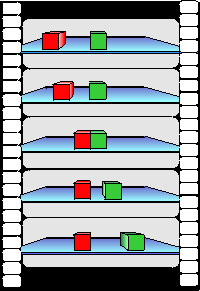What We Do
We currently research “Theory of Mind” mechanisms in preschoolers
“Theory of Mind” in Preschoolers
From about the second year onward, infants and children can understand that other people’s actions reflect invisible states like wanting, pretending, and believing. We call this commonsense ability, “theory of mind.” We are interested in the nature of this early competence.
Naturally, there are limits on the sorts of mental state problems young children can solve. We are also interested in how these limitations change between infancy and four years of age and beyond. We devise simple tests of reasoning to probe the nature of these changes.
-
Many basic questions about the human mind can be addressed by studying infants. Although babies do not understand language, we can “ask” them to compare virtually anything. They give us their “answers” by how long they look.

We can show infants two different pictures, side by side. If babies spend reliably more time looking at one picture than at the other, then they must be able to see some difference between them.
Or, instead of showing babies two pictures simultaneously, we can show them two things, one after the other. This way babies have to remember the first picture to compare it to the second.
We can even show babies short movie films or ‘live action’ events, instead of static pictures. Our infants simply sit in a baby chair or in a parent’s lap — and watch…
Meanwhile, we make careful measurements of each unbroken gaze the infant gives the movie or event. From this record, we can reconstruct how baby remembered and compared what we showed her.
The Cognitive Development Lab has studied infants’ perception of simple events like blocks colliding, hands picking up objects, or objects disappearing into containers. Through careful choice of comparison events, we discovered that infants with little experience of the world already have a powerful idea of physical cause and effect.
We are currently expanding on these findings and on findings from other labs. At the moment, we are particularly interested in infants’ attention to objects and in how babies understand people’s goals and other mental states…
-
Autism is a neurodevelopmental disorder with biological origins. It produces mental handicap distinguished by severe impairments in social competence.

Research by this laboratory over the last 25 years has shown that children with autism have a specific impairment in their ability to develop “theory of mind.”
Despite typically out-performing preschool children on a wide range of general reasoning tasks, older children with autism do quite poorly on reasoning about “theory of mind.” Children with other mental handicaps, such as Down’s or William’s syndrome, do not show this pattern. It is likely that impairment to a specialized “theory of mind” mechanism in the brain plays an important role in producing the distinctive impairments in social and communicative competence seen in the syndrome of childhood autism.
We are continuing to investigate the nature of the cognitive mechanisms that comprise the “theory of mind” instinct and their impairment in childhood autism. In our lab, the study of normal development goes hand in hand with the study of abnormal development.